|
|
|
Sort Order |
|
|
|
Items / Page
|
|
|
|
|
|
|
| Srl | Item |
| 1 |
ID:
111183
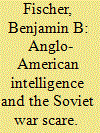

|
|
|
|
|
| Publication |
2012.
|
| Summary/Abstract |
During the Soviet war scare of the 1980s, British intelligence shared vital information from KGB officer Oleg Gordievsky with its American partners. The US intelligence community, however, was suspicious of the message and the messenger, dismissing Soviet 'war talk' as disinformation. Some officials even believed that the British had tweaked their reports to influence US policy. President Ronald Reagan, however, on the advice of Prime Minister Margaret Thatcher, listened to Gordievsky rather than his intelligence advisors. The war scare had a profound influence on Reagan's thinking about nuclear war, Kremlin fears, and Soviet-American relations that led him to seek a new détente with Moscow and the end of the Cold War through diplomacy rather than confrontation. Subsequent events and post-Cold War revelations vindicated Gordievsky. Reagan sought his advice on the eve of his first summit meeting with Mikhail Gorbachev and later expressed his gratitude during a private meeting in the Oval Office.
|
|
|
|
|
|
|
|
|
|
|
|
|
|
|
|
| 2 |
ID:
143766


|
|
|
|
|
| Summary/Abstract |
In the autumn of 1962, two weeks before U-2 aerial photographs confirmed Soviet deployments of nuclear missiles in Cuba, the US intelligence community attempted to image the island with the spy satellite Corona. Insufficient image resolution and extensive cloud cover, however, prevented this photography from providing solid evidence confirming or denying the presence of offensive missiles. This event – previously unaddressed either by Missile Crisis or Corona scholars – illustrates both the promise and the limits of early satellite imagery intelligence. It further provides insight into the early imagery tasking and coordination process and demonstrates needs that drove further development of national satellite reconnaissance in the years that followed.
|
|
|
|
|
|
|
|
|
|
|
|
|
|
|
|
| 3 |
ID:
178971


|
|
|
|
|
| Summary/Abstract |
US intelligence services’ assessments of Iran’s political stability in the late 1970s were imperfect but not incompetent.
|
|
|
|
|
|
|
|
|
|
|
|
|
|
|
|
| 4 |
ID:
122916
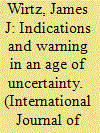

|
|
|
|
|
| Publication |
2013.
|
| Summary/Abstract |
Indications and warning intelligence is an important and time-tested methodology employed by intelligence analysts to warn military officers and policymakers about changes in an opponent's operational "posture" which indicate that the likelihood of dangerous or aggressive activity is increasing. In recent times, it has fallen out of fashion because policymakers and the public alike have come to expect that the Intelligence Community will be able to provide "specific event predictions" of an opponent's future actions. In other words, people tend to believe that intelligence analysts should be able to state who is about to undertake some unwanted activity, as well as where, how, when and why the action will unfold.
|
|
|
|
|
|
|
|
|
|
|
|
|
|
|
|
| 5 |
ID:
123998


|
|
|
|
|
| Publication |
2013.
|
| Summary/Abstract |
In days gone by, before the advent of 24-hour TV channels and news radio, not to mention the Internet and social media, a key task for duty officers in the Central Intelligence Agency's (CIA) Operations Center was to monitor radio broadcasts so as to be able to inform the Director of Central Intelligence (DCI) of events that might merit attention or could require action.
|
|
|
|
|
|
|
|
|
|
|
|
|
|
|
|
| 6 |
ID:
127716


|
|
|
|
|
| Publication |
2014.
|
| Summary/Abstract |
In the debate on intelligence contracting, intelligence officers are grouped into two personnel categories characterized by opposing sets of motivations and interests. Government employees are assumed to be motivated by a higher goal related to national security, while intelligence contractors are said to be motivated primarily by pecuniary interests and loyal first and foremost to their shareholders. Contemporary research on human motivation, however, suggests that the two personnel categories are not all that different in that both appear to be intrinsically motivated and loyal primarily to the mission at hand, namely national security. Moreover, comparative research on public organizations and private corporations suggests that there are more similarities between the two than there are differences. This must lead us to re-examine the recent criticism fielded against the practice of intelligence contracting.
|
|
|
|
|
|
|
|
|
|
|
|
|
|
|
|
| 7 |
ID:
116380
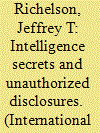

|
|
|
|
|
| Publication |
2012.
|
| Summary/Abstract |
For some, the New York Times is an infuriating newspaper. They may object to the well-left-of-center opinions of its editorial board, rampant nonsense from the keyboards of Thomas Friedman and Paul Krugman, or the evident bias in the news stories on its front page that provide daily entries for TimesWatch. 1 Undoubtedly, a number of United States Presidents have been among those who found the Times annoying for those reasons.
|
|
|
|
|
|
|
|
|
|
|
|
|
|
|
|
| 8 |
ID:
169009
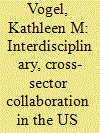

|
|
|
|
|
| Summary/Abstract |
How does one design and sustain interdisciplinary, cross-sector collaboration to improve intelligence results for twenty-first century security threats? This paper will analyse five past and present initiatives designed to create interdisciplinary, cross-sectoral collaboration within different agencies of the US Intelligence Community (IC). We will discuss key features of each effort, their successes and challenges, identify common themes and, propose which collaborative model might be most advantageous for a particular type of project based on project constraints. In so doing, we provide direction for IC leaders seeking to improve academia–industry–intelligence partnerships for future planning on intelligence-funded collaborations.
|
|
|
|
|
|
|
|
|
|
|
|
|
|
|
|
| 9 |
ID:
122373


|
|
|
|
|
| Publication |
2013.
|
| Summary/Abstract |
Nunn-Lugar should be replaced with a new Russian-American program that should involve fewer projects and less funding. Let us call it New Partnership. Its main principle should be equality, rather than patronizing through money infusions from donors.
|
|
|
|
|
|
|
|
|
|
|
|
|
|
|
|
| 10 |
ID:
153069
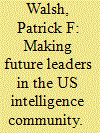

|
|
|
|
|
| Summary/Abstract |
This article explores what factors are important in developing the future leaders of the US intelligence community in the post-9/11 security environment. It surveys traditional leadership theory to assess whether any of its perspectives are applicable to understanding leadership in the intelligence context. It argues, that although some leadership theory may be applicable, the intelligence studies field may be better served by developing its own body of leadership theory. Second, any leadership theory needs to consider together the two synergistic components of intelligence leadership: personal leadership development and the ability to lead organization reform. Furthermore, the role of intelligence governance may be the most critical factor in promoting better leaders of US intelligence agencies and the broader community.
|
|
|
|
|
|
|
|
|
|
|
|
|
|
|
|
| 11 |
ID:
133416
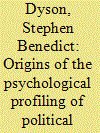

|
|
|
|
|
| Publication |
2014.
|
| Summary/Abstract |
The US intelligence community prepares occasional psychological profiles of foreign political leaders. The origins of these practices lie in frantic and ad hoc attempts to understand the character of Adolf Hitler during the latter stages of the Second World War. The US Office of Strategic Services (OSS) commissioned profiles of Hitler, contracting with a titan of personality theory in Professor Henry A. Murray and practicing psychoanalyst Walter C. Langer. Reconstructing the history of these profiles grounds the contemporary analysis of foreign leaders in the lessons of the pioneers. Useful insights on the challenges of profiling leaders, the relationship of academic theories - and academic personnel - to government, and the role of intelligence in policy abound.
|
|
|
|
|
|
|
|
|
|
|
|
|
|
|
|
| 12 |
ID:
104245
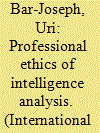

|
|
|
| 13 |
ID:
145242


|
|
|
|
|
| Summary/Abstract |
Looking at trends of professionalization of intelligence analysis within the United States Air Force as a subset of the broader US Intelligence Community, this paper calls for a re-evaluation of the professionalization of intelligence analysis away from a bureaucratic ‘corporateness’ approach examining the traits of a profession. Instead, reform of intelligence analysis should focus on the unique expertise and responsibility that define the profession. It identifies the analyst's unique expertise as managing adversary information to reduce a decision maker's uncertainty, and the responsibility in striving to improve capabilities within the profession while ensuring both the strengths and limitations of intelligence analysis are understood by intelligence customers. By focusing on corporateness, the community jeopardizes reform efforts by moving professionalization toward ‘getting the right answer’ and away from a broader understanding of the strengths and limitations inherent in the field of intelligence, where getting the right answer isn't often attainable.
|
|
|
|
|
|
|
|
|
|
|
|
|
|
|
|
| 14 |
ID:
147583


|
|
|
|
|
| Summary/Abstract |
Despite intense scrutiny and promised fixes resulting from intelligence ‘transformation’ efforts, erroneous analytic assessments persist and continue to dominate news coverage of the US intelligence community. Existing analytic training teaches analysts about common cognitive biases and then aims to correct them with structured analytic techniques. On its face, this approach is eminently reasonable; on close inspection, incomplete and imbalanced. Current training is anchored in a mid-twentieth century understanding of psychology that focuses on checking over-confidence and rigidity but ignores the problems of under-confidence and excessive volatility. Moreover it has never been validated against objective benchmarks of good judgment. We propose a new approach: (a) adopting scientifically validated content and regularly testing training to avoid institutionalizing new dogmas; (b) incentivizing analysts to view training guidelines as means to the end of improved accuracy, not an end in itself.
|
|
|
|
|
|
|
|
|
|
|
|
|
|
|
|
| 15 |
ID:
111622
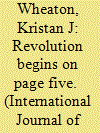

|
|
|
| 16 |
ID:
106324
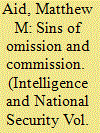

|
|
|
|
|
| Publication |
2011.
|
| Summary/Abstract |
American intelligence professionals have long understood that the US intelligence community is, and always has been, a closed and insular society, with each agency within the intelligence community taking pride in having its own unique bureaucratic identity, distinct corporate culture, operating environments, social dynamics, and internal behavior patterns that have been molded and shaped by external events and internal forces over the past 60 years. These 'strategic cultural' factors mean that the agencies comprising the US intelligence community are, in many respects, unique bureaucratic entities, operating far differently than comparable large American corporations and government agencies. These strategic cultural factors shape and define the environment within which the US intelligence agency works, dictate how American intelligence agencies perform their mission, and also help to explain why they repeatedly make the same mistakes and find it difficult to fix the longstanding problems which contributed to the failures. Within the context of the recent 9/11 and Iraqi weapons of mass destruction intelligence failures, this article explores the role played by these strategic cultural factors in helping to explain a series of historical intelligence failures by the US intelligence community.
|
|
|
|
|
|
|
|
|
|
|
|
|
|
|
|
| 17 |
ID:
121701


|
|
|
|
|
| Publication |
2013.
|
| Summary/Abstract |
The U.S. intelligence community has determined with "varying degrees of confidence" that the regime of Syrian President Bashar al-Assad used chemical weapons against its own people, the White House said last month.
|
|
|
|
|
|
|
|
|
|
|
|
|
|
|
|
| 18 |
ID:
121717
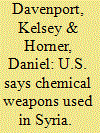

|
|
|
|
|
| Publication |
2013.
|
| Summary/Abstract |
The U.S. intelligence community has "high confidence" that the Syrian regime used chemical weapons on a small scale against opposition forces multiple times over the past year, the White House said in a June 13 statement.
|
|
|
|
|
|
|
|
|
|
|
|
|
|
|
|
| 19 |
ID:
101812
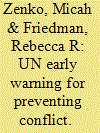

|
|
|
|
|
| Publication |
2011.
|
| Summary/Abstract |
Despite repeated calls for a coordinated UN early warning system for preventing conflict, early warning is currently performed piecemeal by seven UN bodies and one ad hoc initiative. Due to the difficulties inherent in the UN's structure - the transparency of the organization and member states' sensitivity about perceived encroachments on their sovereignty - the UN cannot, and arguably should not, develop a comprehensive early warning system for preventing conflict. Instead, the UN could improve its ability to analyse and absorb early warning information already in the system by: reforming the Executive Office of the Secretary-General; strengthening the early warning and assessment capacities within the aforementioned bodies; soliciting greater cooperation with the US intelligence community and regional organizations; and promoting enhanced inter-agency cooperation.
|
|
|
|
|
|
|
|
|
|
|
|
|
|
|
|
| 20 |
ID:
156433


|
|
|
|
|
| Summary/Abstract |
THE UNITED STATES INTELLIGENCE COMMUNITY struggled to deliver impartial and dispassionate analysis on the Nigerian Civil War. Two US presidents and the American public had strong, often emotional, responses to the 30-month conflict, which pitted the Federal Government against the secessionist Republic of Biafra. President Johnson saw the war as an unwelcome distraction, ordering aides to get those ‘babies off [his] TV set’.1 President Nixon spied an opportunity, seizing on the conflict as a way to show his human side; he argued that the United States was not doing enough to ease civilian suffering in the secessionist enclave.2 Similarly, many Americans identified with Nigeria's Igbos who, aided by a slick propaganda campaign, portrayed in moving images the war's toll on Biafra's civilian population. Time and Life magazines published sympathetic cover stories on Biafra's plight. Jimi Hendrix and Joan Baez participated in a relief concert for Biafra in Manhattan. The war, which lasted from July 1966 to January 1970 and led to the deaths of more than half a million people, stirred US citizens to march in public rallies and donate more than US$11 million to feed, clothe, and assist Biafra's displaced population.
|
|
|
|
|
|
|
|
|
|
|
|
|
|
|
|
|
|
|
|
|